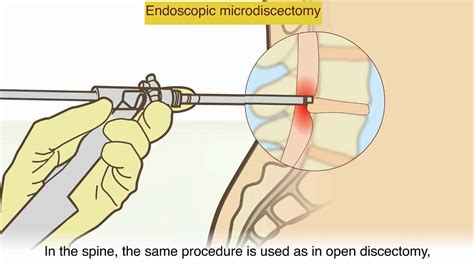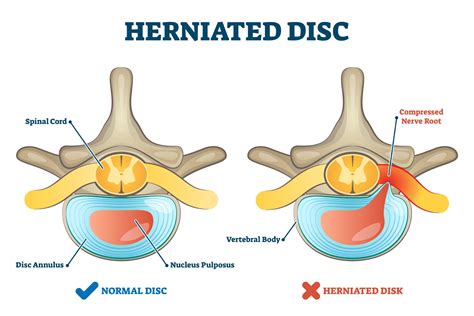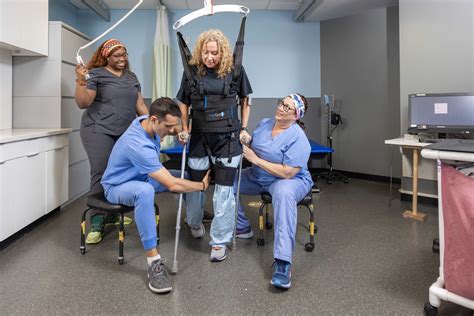Intro
Discover how herniated disc surgery alleviates back pain, sciatica, and numbness, improving spinal health and mobility through minimally invasive procedures, physical therapy, and rehabilitation techniques.
Herniated disc surgery is a highly effective treatment option for individuals suffering from severe back pain and limited mobility due to a herniated disc. A herniated disc, also known as a slipped or ruptured disc, occurs when the soft inner gel of the disc leaks out through a tear in the outer layer, putting pressure on nearby nerves and causing discomfort. While surgery is often considered a last resort, it can provide significant relief and improve the quality of life for those who have tried other treatments without success. In this article, we will explore the benefits of herniated disc surgery and how it can help individuals regain control over their lives.
The decision to undergo herniated disc surgery is not taken lightly, and it is essential to understand the potential benefits and risks involved. For many people, the prospect of surgery can be daunting, but it is crucial to weigh the potential advantages against the drawbacks. Herniated disc surgery can be a life-changing procedure, allowing individuals to return to their normal activities, free from the constraints of chronic pain and limited mobility. By understanding the ways in which herniated disc surgery can help, individuals can make informed decisions about their treatment options and take the first step towards a pain-free life.
Herniated disc surgery is a complex procedure that requires careful consideration and planning. The goal of the surgery is to relieve pressure on the affected nerves, remove the damaged disc, and stabilize the spine. There are several types of herniated disc surgery, including discectomy, laminectomy, and spinal fusion. Each type of surgery has its own set of benefits and risks, and the choice of procedure depends on the individual's specific condition and medical history. By consulting with a qualified healthcare professional, individuals can determine the best course of treatment for their unique situation and take the first step towards a successful recovery.
Understanding Herniated Disc Surgery

Herniated disc surgery is a surgical procedure designed to relieve pressure on the affected nerves and stabilize the spine. The surgery typically involves the removal of the damaged disc and any surrounding tissue that may be compressing the nerves. In some cases, the surgeon may also need to fuse the surrounding vertebrae to provide additional stability and support. The goal of the surgery is to relieve pain, restore mobility, and improve the overall quality of life for the individual. By understanding the underlying principles of herniated disc surgery, individuals can better appreciate the potential benefits and make informed decisions about their treatment options.
Benefits of Herniated Disc Surgery
The benefits of herniated disc surgery are numerous and well-documented. Some of the most significant advantages include:- Relief from chronic pain and discomfort
- Improved mobility and flexibility
- Enhanced overall quality of life
- Reduced risk of further complications and injuries
- Increased ability to participate in daily activities and hobbies
By undergoing herniated disc surgery, individuals can experience significant improvements in their overall health and wellbeing. The surgery can help to relieve pressure on the affected nerves, reducing pain and discomfort and allowing individuals to return to their normal activities. Additionally, the surgery can help to stabilize the spine, reducing the risk of further complications and injuries.
Types of Herniated Disc Surgery

There are several types of herniated disc surgery, each with its own set of benefits and risks. The most common types of surgery include:
- Discectomy: This type of surgery involves the removal of the damaged disc and any surrounding tissue that may be compressing the nerves.
- Laminectomy: This type of surgery involves the removal of the lamina, a bony plate that covers the spinal canal, to relieve pressure on the affected nerves.
- Spinal fusion: This type of surgery involves the fusion of the surrounding vertebrae to provide additional stability and support.
Each type of surgery has its own set of advantages and disadvantages, and the choice of procedure depends on the individual's specific condition and medical history. By consulting with a qualified healthcare professional, individuals can determine the best course of treatment for their unique situation.
Risks and Complications
As with any surgical procedure, there are risks and complications associated with herniated disc surgery. Some of the most common risks include:- Infection
- Bleeding
- Nerve damage
- Blood clots
- Reaction to anesthesia
It is essential to carefully weigh the potential benefits against the risks and to discuss any concerns with a qualified healthcare professional. By understanding the potential risks and complications, individuals can make informed decisions about their treatment options and take the necessary steps to minimize their risk.
Recovery and Rehabilitation

The recovery and rehabilitation process for herniated disc surgery typically involves a combination of rest, physical therapy, and pain management. The goal of the recovery process is to allow the body to heal and to regain strength and mobility. The recovery process can take several weeks or months, depending on the individual's overall health and the complexity of the surgery.
During the recovery process, individuals may need to:
- Rest and avoid heavy lifting or bending
- Participate in physical therapy to regain strength and mobility
- Take pain medication to manage discomfort
- Attend follow-up appointments with their healthcare provider
By following a comprehensive recovery and rehabilitation plan, individuals can minimize their risk of complications and ensure a successful outcome.
Returning to Normal Activities
After undergoing herniated disc surgery, individuals can expect to return to their normal activities gradually. The recovery process can take several weeks or months, depending on the individual's overall health and the complexity of the surgery. It is essential to follow a comprehensive recovery and rehabilitation plan to minimize the risk of complications and ensure a successful outcome.Some tips for returning to normal activities include:
- Starting with gentle exercises and gradually increasing intensity
- Avoiding heavy lifting or bending
- Taking regular breaks to rest and avoid fatigue
- Participating in physical therapy to regain strength and mobility
By following these tips and working closely with a qualified healthcare professional, individuals can return to their normal activities and enjoy a improved overall quality of life.
Conclusion and Next Steps

In conclusion, herniated disc surgery can be a highly effective treatment option for individuals suffering from severe back pain and limited mobility due to a herniated disc. By understanding the benefits and risks of the surgery, individuals can make informed decisions about their treatment options and take the first step towards a pain-free life. It is essential to consult with a qualified healthcare professional to determine the best course of treatment for their unique situation.
We invite you to share your thoughts and experiences with herniated disc surgery in the comments below. If you have any questions or concerns, please do not hesitate to reach out to us. We are committed to providing you with the most up-to-date and accurate information to help you make informed decisions about your health.
What are the benefits of herniated disc surgery?
+The benefits of herniated disc surgery include relief from chronic pain and discomfort, improved mobility and flexibility, enhanced overall quality of life, reduced risk of further complications and injuries, and increased ability to participate in daily activities and hobbies.
What are the risks and complications associated with herniated disc surgery?
+The risks and complications associated with herniated disc surgery include infection, bleeding, nerve damage, blood clots, and reaction to anesthesia.
How long does the recovery process take after herniated disc surgery?
+The recovery process can take several weeks or months, depending on the individual's overall health and the complexity of the surgery.
